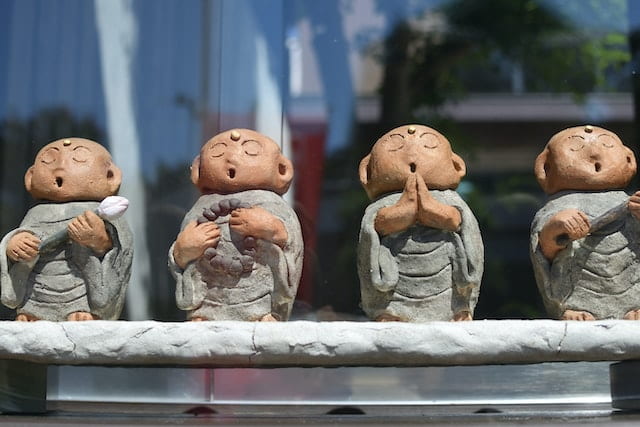Chanting 108 times can have a profound effect on the mind and body, including improving focus, calming the nervous system, deepening one’s spiritual connection, and providing physical benefits such as regulation of breath, reduction of stress, and boosting of the immune system. In this article, we will explore the history, significance, and benefits of chanting 108 times, and how this practice can be incorporated into one’s daily life to improve overall health and well being.

Table of Contents
Cultural Significance of 108
108 in Hinduism
In Hinduism, 108 is revered as a highly significant number. It’s seen as symbolic of the universe’s structure and the spiritual path. The number 108 is found in various aspects of Hindu cosmology, including the distance between the Earth and the Sun, and the Earth and the Moon, which are approximately 108 times their respective diameters. There are also 108 Upanishads, which are important texts in Hindu philosophy. Additionally, in Hindu deities’ iconography, Lord Shiva is said to have 108 dance forms, and there are 108 names for Hindu gods.
108 in Buddhism
Buddhism also attributes special significance to the number 108. In traditional Buddhist rosaries, or malas, there are 108 beads used for counting as one recites prayers or mantras. This is believed to help achieve a state of Zen or inner peace. The number is also significant in Tibetan Buddhism, where there are 108 volumes of the Kangyur, a key text. The Buddhist philosophy identifies 108 earthly temptations one must overcome to achieve nirvana.
108 in Other Cultures
- Jainism: In Jainism, the number 108 signifies various auspicious aspects. For instance, there are 108 virtues described in Jain texts.
- Sikhism: The Sikh tradition has a necklace called a Mala, which contains 108 beads, used in meditation to count repetitions of mantras.
- Yoga: In yoga, there are said to be 108 sacred places of the body, and many practices include 108 sun salutations to honor change, such as the change of seasons.
- Japanese Culture: In Japan, at the end of the year, a bell is rung 108 times in Buddhist temples to finish the old year and welcome the new one, symbolizing the 108 earthly temptations.
The Sacred Number: 108
Here are some additional facts and examples:
- Astronomy: According to ancient Indian astronomy, there are 27 constellations in the galaxy, each divided into four parts or padas, totaling 108.
- Mala beads: In many spiritual traditions, including Hinduism and Buddhism, prayer or meditation beads called malas typically have 108 beads, which are used to count the repetitions of mantras or prayers.
- Time: There are said to be 108 minutes in a day according to some ancient timekeeping systems, and the distance between the Sun and Earth is said to be 108 times the diameter of the Sun.
Mind, Body, and Spirit Benefits
Chanting a mantra or prayer 108 times can have a number of benefits for the mind, body, and spirit. Here are some possible results and features of this practice:
- Focus: The repetition of the mantra or prayer helps to focus the mind and bring it into a state of concentration. By chanting 108 times, the mind becomes absorbed in the sound of the chant and is less likely to be distracted by other thoughts or sensations.
- Calming: Chanting can have a calming effect on the mind and body. By focusing on the sound of the chant and the breath, the nervous system can be calmed, and stress and anxiety can be reduced.
- Spiritual connection: Chanting can help to deepen one’s spiritual connection, as it is a way to connect with the divine or higher power. By repeating a sacred phrase or name, one can feel a sense of devotion and connection to something greater than oneself.
- Physical benefits: Chanting can have physical benefits as well, including regulation of the breath, reduction of stress and blood pressure, and improvement of overall well-being.
- Energy: Chanting is believed to help awaken and balance the body’s energy centers, or chakras, which can have a positive effect on one’s health and vitality.
- Community: Chanting with others can create a sense of community and shared experience. It can be a way to connect with others who share similar beliefs and values, and to feel a sense of belonging.
Chanting 108 times can be a powerful and transformative practice that can have a wide range of benefits for the mind, body, and spirit.
Physical Benefits
Chanting a mantra or prayer 108 times can have various physical benefits, including:
- Regulation of breath: Chanting involves deep breathing, which can help to regulate the breath and increase oxygen intake. This can have a positive effect on the respiratory system and can help to reduce stress and anxiety.
- Reduction of stress: Chanting can have a calming effect on the nervous system and can help to reduce stress and tension in the body. It is believed that the vibration of the sound produced during chanting can have a soothing effect on the nervous system.
- Lowering of blood pressure: Chanting has been shown to lower blood pressure in some studies. This may be due to its ability to reduce stress and tension in the body.
- Enhancement of overall well-being: Chanting can have a positive effect on one’s overall well-being. It is believed that the sound vibrations produced during chanting can have a healing effect on the body and can help to balance the energy centers, or chakras, which can lead to improved physical and mental health.
- Strengthening of vocal cords and diaphragm: Chanting involves the use of the vocal cords and diaphragm, which can help to strengthen these muscles over time. This can lead to improved breathing and vocal control.
- Boosting of immune system: Chanting can boost the immune system by reducing stress and anxiety, which can have a negative effect on the immune system. By reducing stress and tension in the body, chanting can help to boost the immune system and improve overall health.
FAQ
How long does it typically take to chant 108 times?
The duration can vary based on the individual’s pace and the length of the chant, but typically it ranges from a few minutes to half an hour.
Is chanting 108 times suitable for beginners in meditation?
Beginners can start with fewer repetitions and gradually build up to 108, making it a suitable practice for all experience levels.
See Related Posts

Gregorian Christmas Chants

Love Spell Chants

Best Softball Chants for U12

AKA Sorority Chants

Argentina Football Chants

Short Chants and Cheers

Alabama Football Chants

Everything to Know About African Chants

